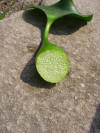WILD
FOODIES' HOME PAGE
PLANT PROFILE LIST
NAME: Water Hyacinth
SPECIES / FAMILY: Eichhornia Crassipes / Pontederiaceae
OTHER COMMON NAME(S):
CONDITIONS:
sun/partial shade, moist soil, water
|
PARTS: |
EDIBLE |
TASTE |
RAW/COOK |
SEASON |
|
All |
|
|
|
|
|
Shoots |
|
|
|
|
|
Leaves |
|
bland |
COOK |
Spring/Summer |
|
Stalk/Stem |
|
|
|
|
|
Buds |
||||
|
Flowers |
|
|
BOIL/CANDY |
Spring/Summer |
|
Fruits |
|
|
|
|
|
Pods |
|
|||
|
Seeds |
|
|
|
|
|
Nuts |
|
|
|
|
|
Roots |
|
|
|
|
|
Bark |
|
|
|
|
PORTION:
COMMENT: Young leaves and petioles - cooked. Virtually tasteless. Javanese sometimes cook and eat the green parts and inflorescence. Flower spikes - cooked. (1) Leaves boiled or fried, young bulbous bottoms fried, flowers boiled or candied.
CAUTION: All can still make some people itch after cooking, try cautiously.(2)
NUTRITION/MEDICINAL: “Said to be used as a carotene-rich table vegetable in Formosa.”(1) “Herbalists in India say juice from the water hyacinth is good for treating fresh wounds to keep them from infecting. The flowers have also been used to treat skin conditions on horses.”(2)
LOOK-A-LIKES:
POISONOUS LOOK-A-LIKES:
OTHER USES: Phytoremediation. “Water hyacinths are potentially an excellent source of biomass. Through an anaerobic fermentation process, polluted hyacinths can be converted to the natural gas methane - a costly process that may become more economical as supplies of underground natural gas are depleted. Dried and cleansed plants can be used as fertilizer and plant mulch. Eventually, living aquatic plants might serve aboard long-distance manned spacecraft, absorbing wastes and converting carbon dioxide to oxygen, then being themselves converted into food…”(1)
SOURCE LINKS (may include nutritional and medicinal info, plus other uses):

_1_small.jpg)


